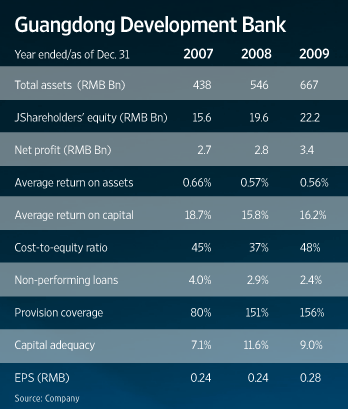HONG KONG (Dow Jones Investment Banker) – Another week, another beauty pageant for a multi billion- dollar IPO in Hong Kong. In local fashion, Guangdong Development Bank (GDB) is said to be meeting brokers next Sunday and Monday to select bookrunners for a capital raising of up to US$4 billion, with a dual listing in Shanghai and Hong Kong.
FIG, ECM and China bankers will already have slaved away on written proposals, and this should make for an interesting time for a number of houses. We look at the equity story and at likely candidates to lead the offering.
Founded in 1988, GDB is one of the earliest incorporated joint-stock commercial banks in China. With nationwide licenses but networks usually limited to their region of origin, these are generally owned by state-owned enterprises and local governments. Not so in the case of GDB, where a Citigroup-led consortium agreed to acquire an aggregate stake of 85% in 2006.
GDB now has 29 branches, a total of 544 outlets, 676 self-service banks and more than 3,600 ATMs on the Eastern and Southern seaboards.
The mid-sized lender has a history of innovation. It was one of the first banks in China to engage in mortgage lending, the development of Western-style credit cards and offshore financial activities. Having returned to profit in 2007, following a restructuring, it had about US$102 billion equivalent in assets, with shareholders’ equity of US$3.4 billion in 2009.

The bank’s credit ratings with Moody’s and Fitch are stable, and the IPO is aimed at further strengthening its capital base.
At US$4 billion, however, the deal size looks chunky for a 25% stake, and based on precedent valuations of 1.5x to 1.8x book value – although the latest published financials are dated – and GDB has posted good growth in prior years.
Nine Chinese banks have listed in Hong Kong, and eight of these also have a dual listing on the mainland. China Everbright Bank, which is quoted in Shanghai, has recently appointed lead banks for a proposed US$6 billion to US$7 billion IPO in Hong Kong.
A number of international banks, including Bank of America, Goldman Sachs, HSBC, Royal Bank of Scotland and others, have taken (and in some cases, later sold) stakes in Chinese banks in the past, as have investors such as Singapore’s GIC and Newbridge, and what also makes GDB’s investment case interesting is its shareholder base.
In 2006, Citigroup, China Life, CITIC Trust Co. and State Grid Corp. of China (since renamed Yingda International), each chipped in for a 20% stake. IBM Credit LLC also owns 3.69%. Foreign investments in domestic banks in China are currently capped at 25%.
The beauty parade should see much competition. Some houses have a track record of recently leading IPOs for mainland banks in Hong Kong. Morgan Stanley was a global coordinator of both Agricultural Bank of China Ltd’s US$12 billion H share offering last summer (now trading 38% up from the IPO price) and Chongqing Rural Commercial Bank’s US$1.35 billion IPO in December (2.5% up). However, its involvement in China Everbright’s forthcoming listing could be perceived as a conflict, as will also be the case for UBS and CICC, another top bank on the ABC deal.
Other bookrunners on the ABC IPO, including Goldman Sachs, Deutsche Bank, JPMorgan (which generally has strong FIG credentials, and with top-ranked bank research in Asia in 2010) and Macquarie will probably also be in the running – as will Nomura, the other lead on the Chongqing deal. It’s also likely that Citi, as a shareholder, could appear at the top.
As is becoming more common these days, several houses will be appointed. Their final roles may be distributed closer to launch, after commitments by cornerstone investors have been received. Here, the usual suspects, including sovereign wealth funds from the Middle East, as well as Hong Kong tycoons, will no doubt feature.
On the ABC deal, the RFP was said to have run to 35 pages, and to have been distributed to 20 brokers for the H-share tranche, and to another 10 for the domestic IPO.
It’s tough earning that US$100 million fee.
(Philippe Espinasse worked as an investment banker in the U.S., Europe and Asia for more than 19 years and now writes and works as an independent consultant in Hong Kong. Visit his website at https://www.ipo-book.com. Readers should be aware that Philippe may own securities related to companies he writes about, may act as a consultant to companies he mentions and may know individuals cited in his articles. To comment on this column, please email [email protected]).
[This article was originally published on Dow Jones Investment Banker on 7 April 2011 and is reproduced with permission].
Copyright (c) 2011, Dow Jones & Company, Inc.
